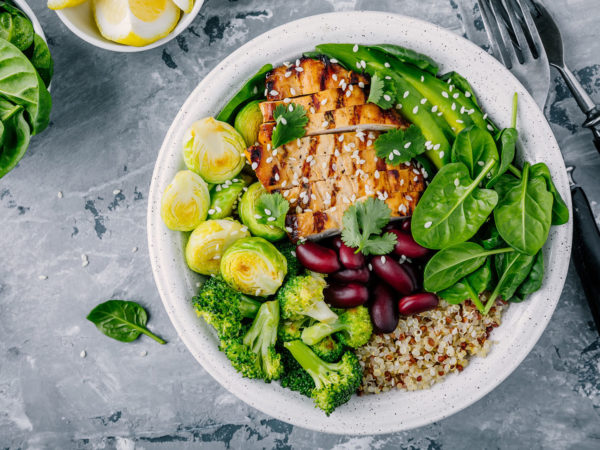
Anything prefixed “flexi” suggests freedom and variety. The Flexitarian Diet is the idea of eating predominantly plant-based foods, whilst also incorporating meat and animal products, in moderation. This makes it an ideal option for those who don’t want to fully convert to vegetarianism or veganism, but who wish to make a conscious, consistent effort to do so where they can.
The versatile nature of the Flexitarian Diet makes it an appealing idea for the average working adult, who may not necessarily have time and energy to source specific foods each time they shop. Below, we take a look at some of the ins and outs…
Flexitarian Diet: the lowdown
There are no restrictive rules where calories are concerned, which may be music to your ears if you’re looking to embrace an eating “lifestyle” as opposed to a diet.
A flexitarian diet can be used to lose weight, but can equally be a healthy long-term way of life and adapted to be suitable for men and women, depending on health goals. It is predominantly based around these ideologies:
- Eating predominantly veg, fruit, whole grains and legumes
- A focus around protein from plants rather than animals
- Eating the most natural food forms/staying away from processed foods
- Limiting added sugar and sweets
The benefits
- Reduced risk of Type 2 Diabetes: Diets comprised of less meat have been proven to reduce the risk of type 2 diabetes. Though research into this in the context of the flexitarian diet is relatively new, it’s likely that the diet is beneficial in this way, as it encourages eating more plant-based foods.
- Possible link to reduced cases of heart disease: vegetarians tend to display a reduced risk of heart disease than non-vegetarians, which would suggest the flexitarian diet also reduces heart-related conditions. One particular study found that people who ate 70% planet-based foods reduced their risk of heart disease by 20% – it’s worth remembering that there are multiple studies out there, all with variable conclusions.
- It’s easy to get the nutrition you need: one of the pitfalls of other, more restrictive diets such as the dissociated diet, veganism and keto (to name a few), is that it can be challenging to know where to look for the nutrients you need day-to-day. As the flexitarian framework is more versatile than these diets, you have a bigger diversity of where to look – something which can be a challenge when food shopping.
Environmental
The flexitarian diet is centred partly around reducing one’s meat consumption which in turn, decreases greenhouse gas emissions, in addition to land and water use.
Consuming more plant-based foods will (hopefully) drive the demand for more land to be dedicated to growing fruit and veg for human consumption, rather than to feed livestock.
Cultivating plants necessitates fewer resources than is needed to rear animals; growing plant protein uses 11 times less energy than it does to make animal protein. With this in mind, being willing to adapt and be flexible about the foods we eat, depending on the environmental trajectory of the planet, could help us live in a healthier world with less pollution and reduce the global carbon footprint.
If you’re giving the Flexitarian Diet a go, we’d love to hear how about your experience. Drop us a line in the comments at the bottom of the page – we’re always interested to hear from you.



I might give this diet a go! I think I need to as well due to lockdown :P. I like the idea of mainly eating fruit and veg along with plant protein, while also playing my part in saving the environment.
I tried this diet from October to mid December. Ive got to say its one of the best diets I’ve ever done! I felt super healthy and positive with what Im putting in my body. I felt more alive and more fit than ever before. I recommened this diet for sure!